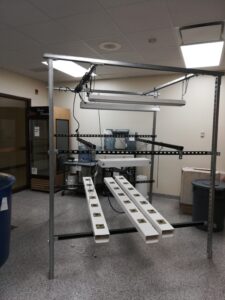Final report for YENC21-166
Project Information
Different than conventional hydroponic and aquaponic systems on the market, we envision an open-faced metal enclosure, with cross-beams on top and in middle of sides (or an indoor pergola of sorts), where two levels of five individual PVC channels are laid to run hydroponic and/or aquaponic growing. While we have the skeleton of the pergola started, we look to ramp up its use by raising greens for our high school’s cafeteria and local food shelves. This will be made possible by student-led decision making, through inquiry-based experiential learning in Green Bay East’s Agriscience classes.
Our Hydroponic and Aquaponic Pergola at East High in Green Bay, WI will have three objectives:
- Grow & provide locally raised produce during colder months to be given to our school’s cafeteria and area food shelves.
- Incorporate inquiry-based, experiential learning into the growing process. Student groups in Agriscience classes will choose their own independent variable changes to test in their own, individual hydroponic channel.
- Partner with local aquaponic grower, The Farmory, to be a control group in raising our own set of tilapia alongside our plants.
Educational & Outreach Activities
Participation Summary:
Activities and Timeline
Late March 2021, Agriscience teacher Zachary Markhardt, will Zoom video chat with Claire Thompson, main contact for The Farmory, in order to set considerations and game plan for using East Agriscience’s Hydroponic and Aquaponic Pergola for an additional control trial for experimental trials done inside The Farmory.
Early April 2021, Zachary Markhardt will order from online vendors and Green Bay hardware stores for materials needed to complete the pergola.
Mid April 2021, The Landscape Management class, under the guidance of Zachary Markhardt, will assemble the channels, pumps, and plumbing float valves inside the pergola. Greens will be seeded by students in rockwool cubes, to be placed into channels upon germination. The Small Animal class, under the guidance of Mr. Markhardt, will plumb a line from our aquaculture tank’s clarifier to a dedicated channel in the pergola. If virtual learning is still mandated in Green Bay Public Schools, Mr. Markhardt will narrate the build process in a video, with discussion questions tied to various steps assigned to students during direct instruction.
April - May 2021, The Landscape Management class, with guidance from Zachary Markhardt, will weekly check conductivity levels in reservoirs, adjust nutrient concentrations, and check plant health. Student groups will take data from their own channel (with an independent variable changed from a control lane. If school is in virtual learning, Mr. Markhardt will meet with each student group in a separate Zoom video call “breakout” room, to show diagnostic results of their hydroponic channel as prompted by the student-led directive.
Late May / Early June 2021, All Agriscience students and Green Bay East staff, under the directive of Zachary Markhardt, will be invited to help fillet and package for tilapia fillets. Fillets will be frozen and donated to either our Eats for East in-school food shelf, a local food pantry, or combination of both.
Early June 2021, The Landscape Management class, with guidance from Zachary Markhardt, will harvest and deliver greens to either our school cafeteria, a local food pantry, or combination of both. Channels will be cleaned by the class and the system will go a rest for the summer.
Early September 2021, New tilapia fish will be ordered through a Green Bay school’s colleague, Thomas Sebranek, by Zachary Markhardt, and added to our aquaculture tank. First trimester’s Landscape Management class, under the guidance of Zachary Markhardt, will begin the start-up process as seen in Mid-April 2021, with the produce exception to cucumbers.
Mid September - November 2021, A similar maintenance and learning process as seen in April - May 2021 will take place. Cucumber tendrils will be trained up to a wire grid by students of the Landscape Management class(es).
December 2021, The Landscape Management class, with guidance from Zachary Markhardt, will harvest and deliver cucumbers to either our school cafeteria, a local food pantry, or combination of both. Channels will be cleaned by the class and re-set to a produce as determined by request from either our school cafeteria, a local food pantry, or combination of both.
Results and materials
For monitoring our hydroponic & aquaponic tank's nutrient levels, a content slide deck was created with a connecting activity. Linked here: https://bit.ly/3HkSYj0 is that Google Slides deck.
For working with the tilapia, which accompany our Aquaponic Pergola, an inquiry-based lab was created. Linked here: https://bit.ly/3B0x9mx is that Google Sheet page.
Learning Outcomes
Return on Investment (ROI)
Comparing hydroponic & aquaponic systems
As mentioned earlier, obstacles of backordered electrical parts, late action on a help desk ticket from our district electrician, and a bankruptcy of our community partner (The Farmory), paired with bigger fish I needed to fry in the wake of hybrid learning in 2021 lead to an incomplete final assembly of the hydroponic pergola. However, curriculum designed to coincide with the pergola was still created with a smaller hydroponic set-up (Flex Farm) we had next to it. The "ROI Aquaponics Activity" http://bit.ly/3HMYKMO allowed students to see the money that moved behind the structures made in the classroom and connect to other entrepreneurial applications where a Return on Investment (ROI) calculation could be useful.
While I realize this isn't what either the judges or general public like to hear, I appreciate SARE's interest in the project and constructive feedback given by the judges from my application. Thank you for your patience and understanding with these unforeseen circumstances.
Project Outcomes
Obstacles of backordered electrical parts, late action on a help desk ticket from our district electrician, and a bankruptcy of our community partner (The Farmory), paired with bigger fish I needed to fry in the wake of hybrid learning in 2021 lead to an incomplete final assembly of the hydroponic pergola.
